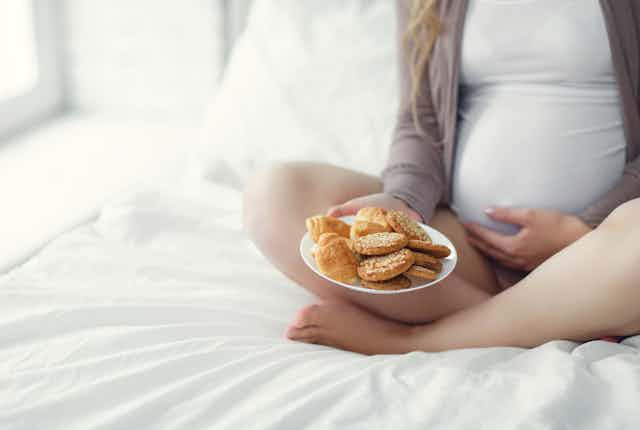Binge eating in pregnancy has serious health implications for mothers and their children. And our latest study shows that it is surprisingly common. Just over 36% of women reported “loss of control over eating” while they were pregnant, with 5% reporting frequent loss of control.
Many earlier studies – including our own – have investigated anorexia and bulimia during pregnancy, but few have looked at binge eating or loss-of-control eating. (Loss-of-control eating is when you feel as though you can’t stop eating, even if you want to, irrespective of the amount consumed.) No one had studied the impact of these behaviours on the offspring.
To fill in these gaps in the scientific knowledge, we analysed data of more than 11,000 women from the Avon Longitudinal Study of Parents and Children. Women from the west of England were included in the study in pregnancy, and both them and their children have contributed to the study over the past 24 years, providing amazing insights into many health problems.
Overeating for two
Our analysis of the data, published in the American Journal of Clinical Nutrition, showed that 36% of women experienced loss-of-control eating during pregnancy.
Just over 5% of the women in our sample experienced frequent loss of control while eating. These women gained an extra 3.5kg (8.2lb), on average, during pregnancy, compared with women who didn’t experience loss-of-control eating. The children of these women were twice as likely to be obese at age 15.
Women who frequently lost control over eating had less vitamin B1 and folic acid, compared with women who didn’t lose control over eating.

Mothers who reported any loss-of-control eating during pregnancy consumed more calories while pregnant and ate more snacks, such as chocolate and cakes. They also had a lower intake of vitamin A, C and B6, and put on more weight during pregnancy, compared with women who didn’t lose control over eating during pregnancy. They were also more likely to diet during pregnancy and were more likely to be unhappy with their body shape.
Loss-of-control eaters also gave birth to heavier babies, and those children were twice more likely to be overweight or obese at age 15.
Although we cannot say exactly why loss-of-control eating during pregnancy is associated with child obesity, the link suggests a way to avoid childhood obesity, which is a growing problem around the world. Identifying women who have loss-of-control eating and supporting them with targeted treatment, such as cognitive behavioural therapy, might help both maternal and child health.

